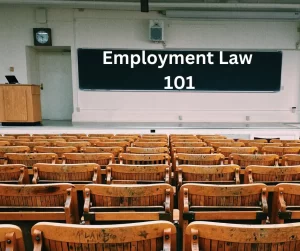
Under Washington State laws, what is “summary judgment” within the context of a lawsuit? Here’s my point of view.
(IMPORTANT: This article is for informational purposes only and is based upon my point of view. Due to the rapidly changing nature of the law, we make no warranty or guarantee concerning the accuracy or reliability of the content in this article. No content on this site, regardless of date, should ever be used as a substitute for direct legal advice from your attorney. Please review our Disclaimer | Terms of Use | Privacy Policy before proceeding.)
Introduction: Summary Judgment
In Washington State, the term “summary judgment” holds significant weight and plays a crucial role in the legal process. It is a procedural tool that allows parties in a lawsuit to seek a swift resolution without proceeding to a full trial; within the context of employment law, employer-defendants typically use this tool against employee–plaintiffs during litigation. This article aims to shed light on the concept of summary judgment within the context of Washington State law, outlining its purpose, criteria, and implications for litigants.
Overview of Summary Judgment
Summary judgment is a legal mechanism designed to expedite the resolution of cases by allowing the court to decide a case without a trial when there is no genuine dispute of material facts. This process is grounded in the belief that if there are no factual issues in dispute, the case can be resolved based on the applicable law. View the associated Washington State Superior Court Civil Rule (CR 56) — NOTE: the link will take you to an external website managed by Washington State.
Purpose and Criteria
The primary purpose of summary judgment is to save time and resources by eliminating the need for a trial when there is no real controversy. To be granted summary judgment in Washington State, a moving party must demonstrate the absence of any genuine issues of material fact and establish that they are entitled to judgment as a matter of law.
Key Criteria for a Successful Motion for Summary Judgment
1. No Genuine Dispute of Material Facts:
The movant must show that there are no genuine disputes regarding the essential facts of the case. All relevant facts must be clear and uncontested.
2. Legal Entitlement to Judgment:
The movant must demonstrate that, based on the established facts and applicable law, they are entitled to judgment in their favor.
3. Burden of Proof:
The burden of proof rests with the party seeking summary judgment. They must present sufficient evidence to convince the court that no trial is necessary.
4. Admissible Evidence:
The proof presented to support a motion for summary judgment must be admissible and adhere to the legal standards mandated by the court.
Implications and Limitations
While summary judgment is a powerful tool, it is not applicable in all cases. Certain types of claims, such as those involving credibility determinations or complex factual disputes, may be less amenable to summary judgment. Additionally, it is not a substitute for a trial when there are genuine issues of material fact that must be resolved by the trier of fact.
Conclusion
Under Washington State laws, summary judgment serves as an effective mechanism for streamlining the legal process and promoting judicial efficiency. It allows for the prompt resolution of cases where there is no real dispute of material facts. Within the context of employment law, employer-defendants typically use this tool against employee-plaintiffs during litigation.
Read Our Related Articles
We invite you to read more of our articles related to this topic:
» Employment Law 101: Alternative Dispute Resolution
» Employment Law 101: Definition of Pleading
» Employment Law 101: Depositions
» Employment Law 101: Discovery (WA State)
» Employment Law 101: Legal Theory
» Employment Law 101: Mediation
» Employment Law 101: Remedies
» Employment Law 101: Statute of Limitations
» Employment Law 101: The Complaint
» Employment Law 101: The Defendant
» Employment Law 101: The Plaintiff
» Employment Law 101: The Summons
LEARN MORE
If you would like to learn more, then consider contacting an experienced attorney to discuss your case. This article is not offered as legal advice and will not establish an attorney-client relationship with Law Office of Gregory A. Williams or the author of this article; please refer to our Disclaimer | Terms of Use | Privacy Policy for more information.
–gw

